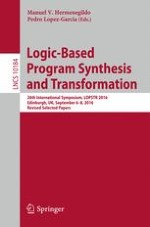2017 | OriginalPaper | Buchkapitel
A Productivity Checker for Logic Programming
verfasst von : Ekaterina Komendantskaya, Patricia Johann, Martin Schmidt
Erschienen in: Logic-Based Program Synthesis and Transformation
Aktivieren Sie unsere intelligente Suche, um passende Fachinhalte oder Patente zu finden.
Wählen Sie Textabschnitte aus um mit Künstlicher Intelligenz passenden Patente zu finden. powered by
Markieren Sie Textabschnitte, um KI-gestützt weitere passende Inhalte zu finden. powered by
